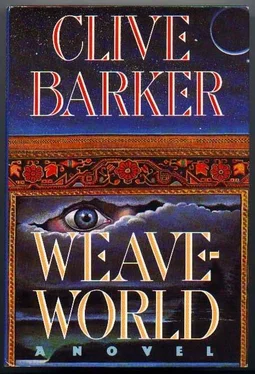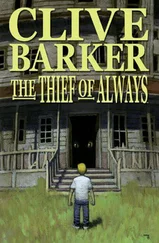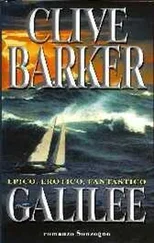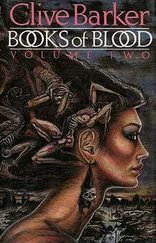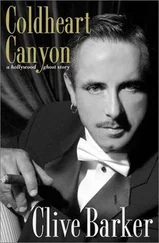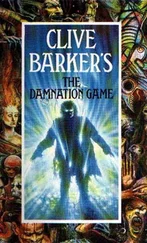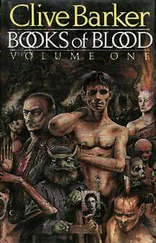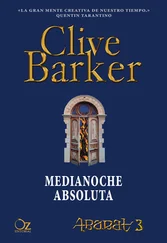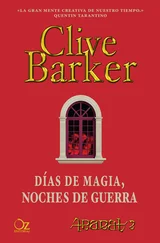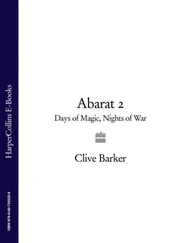Clive Barker - Weave World
Здесь есть возможность читать онлайн «Clive Barker - Weave World» весь текст электронной книги совершенно бесплатно (целиком полную версию без сокращений). В некоторых случаях можно слушать аудио, скачать через торрент в формате fb2 и присутствует краткое содержание. Жанр: Фантастика и фэнтези, на английском языке. Описание произведения, (предисловие) а так же отзывы посетителей доступны на портале библиотеки ЛибКат.
- Название:Weave World
- Автор:
- Жанр:
- Год:неизвестен
- ISBN:нет данных
- Рейтинг книги:4 / 5. Голосов: 1
-
Избранное:Добавить в избранное
- Отзывы:
-
Ваша оценка:
- 80
- 1
- 2
- 3
- 4
- 5
Weave World: краткое содержание, описание и аннотация
Предлагаем к чтению аннотацию, описание, краткое содержание или предисловие (зависит от того, что написал сам автор книги «Weave World»). Если вы не нашли необходимую информацию о книге — напишите в комментариях, мы постараемся отыскать её.
Weave World — читать онлайн бесплатно полную книгу (весь текст) целиком
Ниже представлен текст книги, разбитый по страницам. Система сохранения места последней прочитанной страницы, позволяет с удобством читать онлайн бесплатно книгу «Weave World», без необходимости каждый раз заново искать на чём Вы остановились. Поставьте закладку, и сможете в любой момент перейти на страницу, на которой закончили чтение.
Интервал:
Закладка:
And now, as he approached, it became apparent that his first theory had been incorrect. The birds were not feeding. There was no swooping nor squabbling over a six-legged crumb, nor any sign in the lower air of the insect life that might have attracted these numbers. The birds were simply circling. Some of the smaller species, sparrows and finches, had tired of flying and now lined rooftops and fences, leaving their larger brethren - carrion-crows, magpies, gulls to occupy the heights. There was no scarcity of pigeons here either; the wild variety banking and wheeling in flocks of fifty or more, their shadows rippling across the rooftops. There were some domesticated birds too, doubtless escapees like 33. Canaries and budgerigars: birds called from their millet and their bells by whatever force had summoned the others. For these birds being here was effectively suicide. Though their fellows were at present too excited by this ritual to take note of the pets in their midst, they would not be so indifferent when the circling spell no longer bound them. They would be cruel and quick. They'd fall on the canaries and the budgerigars and peck out their eyes, killing them for the crime of being tamed.
But for now, the parliament was at peace. It mounted the air, higher, ever higher, busying the sky.
The pursuit of this spectacle had led Cal to a part of the city he'd seldom explored. Here the plain square houses of the council estates gave way to a forlorn and eerie no-man's-land, where streets of once-fine, three-storey terraced houses still stood, inexplicably preserved from the bulldozer, surrounded by areas levelled in expectation of a boomtime that had never come; islands in a dust sea.
It was one, of these streets - Rue Street the sign read - that seemed the point over which the flocks were focused. There were more sizeable assemblies of exhausted birds here than in any of the adjacent streets; they twittered and preened themselves on the eaves and chimney tops and television aerials.
Cal scanned sky and roof alike, making his way along Rue Street as he did so. And there - a thousand to one dance he caught sight of his bird. A solitary pigeon, dividing a cloud of sparrows. Years of watching the sky, waiting for pigeons to return from races, had given him an eagle eye; he could recognize a particular bird by a dozen idiosyncrasies in its flight pattern. He had found 33; no doubt of it. But event as he watched, the bird disappeared behind the roofs of Rue Street.
He gave chase afresh, finding a narrow alley whirl cut between the terraced houses half way along the road, and let on to the larger alley that ran behind the row. It had not been well kept. Piles of household refuse had been dumped along its length; orphan dustbins overturned, their contents scattered.
But twenty yards from where he stood there was work going on. Two removal men were manoeuvring an armchair out of the yard behind one of the houses, while a third stared up at the birds. Several hundred were assembled on the yard walls and window sills and railings. Cal wandered along the alley, scrutinizing this assembly for pigeons. He found a dozen or more amongst the multitude, but not the one he sought.
‘What d'you make of it?'
He had come within ten yards of the removal men, and one of them, the idler was addressing the question to him.
‘I don't know,' he answered honestly.
‘Maybe they're goin' to migrate.' Said the younger of the two armchair carriers, letting drop his half of the burden and staring up at the sky.
‘Don't be an idiot, Shane,' said the other man, a West Indian. His name - Gideon was emblazoned on the back of his overalls.
‘Why'd they migrate in the middle of the fuckin' summer?'
‘Too hot,' was the idler's reply. ‘That's what it is. Too fuckin' hot. It's cookin' their brains up there.'
Gideon had now put down his half of the armchair and was leaning against the back yard wall, applying a flame to the half-spent cigarette he'd fished from his top pocket.
‘Wouldn't be bad, would it?' he mused. ‘Being a bird. Gettin' yer end away all spring, then fuckin' off to the South of France as soon as yer get a chill on yer bollocks.'
‘They don't live long,' said Cal.
‘Do they not?' said Gideon, drawing on his cigarette. He shrugged. ‘Short and sweet,' he said. That'd suit me.'
Shane plucked at the half-dozen blond hairs of his would-be moustache. ‘Yer know somethin' about birds, do yer?' he said to Cal.
‘Only pigeons.'
‘Race ‘em, do you?'
‘Once in a while-'
‘Me brother-in-law keeps whippets; said the third man, the idler.' He looked at Cal as though this coincidence verged on the miraculous, and would now fuel hours of debate. But all Cal could think of to say was: ‘Dogs.'
‘That's right,' said the other man, delighted that they were of one accord on the issue. ‘He's got five. Only one died.'
‘Pity,' said Cal.
‘Not really. It was fuckin' blind in one eye and couldn't see in the other.'
The man guffawed at this observation, which promptly brought the exchange to a dead halt. Cal turned his attention back to the birds, and he grinned to see - there on the upper window-ledge of the house - his bird.
‘I see him,' he said.
Gideon followed his gaze. ‘What's that then?'
‘My pigeon. He escaped.'
Cal pointed. ‘There. In the middle of the sill. See him?'
All three now looked. ‘Worth something is he?' said the idler.
‘Trust you, Bazo,' Shane commented.
‘Just asking,' Bazo replied.
‘He's won prizes,' said Cal, with some pride. He was keeping his eyes glued to 33, but the pigeon showed no sign of wanting to fly; just preened his wing feathers, and once in a while turned a beady eye up to the sky.
‘Stay there...' Cal told the bird under his breath,'... don't move.'
Then, to Gideon: ‘Is it all right if I go in? Try and catch him?'
‘Help yourself. The old girl who had the house's been carted off to hospital. We're taking the furniture to pay her bills.'
Cal ducked through into the yard, negotiating the bric-a-brac the trio had dumped there, and went into the house.
It was a shambles inside. If the occupant had ever owned anything of substance it had long since been removed. The few pictures still hanging were worthless: the furniture was old, but not old enough to have come back into fashion; the rugs, cushions and curtains so aged they were fit only for the incinerator. The walls and ceilings were stained by many years accrual of smoke, its source the candles that sat on every shelf and sill, stalactites of yellowed wax depending from them.
He made his way through the warren of pokey, dark rooms, and into the hallway. The scene was just as dispiriting here. The brown linoleum tucked up and torn, and everywhere the pervasive smell of must and dust and creeping rot, she was well out of this squalid place, Cal thought, wherever better off in hospital, where at least the sheets were dry.
He began to climb the stairs. It was a curious sensation ascending into the murk of the upper storey, becoming blinder stair by stair, with the sound of birds scurrying across the slates above his skull, and beyond that the muted cries of gull and crow. Though it was no doubt self-deception, he seemed to hear their voices circling as though this very place were the centre of their attentions. An image appeared in his head, of a photograph from National Geographical. A study of stars, taken with a slow release camera, the pin-point lights describing circles as they moved, or appeared to move, across the sky, with the Pole Star, the Nail of Heaven, steady in their midst.
The wheeling sound, and the picture it evoked, began to dizzy him. He suddenly felt weak, even afraid.
This was no time for such frailties, he chided himself. He had to claim the bird before it flew off again. He picked up his pace. At the top of the stairs he manoeuvred past several items of bedroom furniture, and opened one of the several doors that he was presented with. The room he had chosen was adjacent to the one whose sill 33 occupied. Sun streamed through the curtainless window; the stale heat brought fresh sweat to his brow. The room had been emptied of furniture, the only souvenir of occupancy a calendar for the year 1961. On it, a photograph of a lion beneath a tree, its shaggy, monolithic head laid on vast paws, its gaze contemplative.
Читать дальшеИнтервал:
Закладка:
Похожие книги на «Weave World»
Представляем Вашему вниманию похожие книги на «Weave World» списком для выбора. Мы отобрали схожую по названию и смыслу литературу в надежде предоставить читателям больше вариантов отыскать новые, интересные, ещё непрочитанные произведения.
Обсуждение, отзывы о книге «Weave World» и просто собственные мнения читателей. Оставьте ваши комментарии, напишите, что Вы думаете о произведении, его смысле или главных героях. Укажите что конкретно понравилось, а что нет, и почему Вы так считаете.
